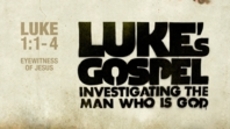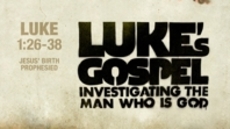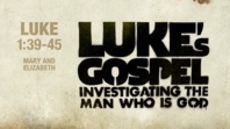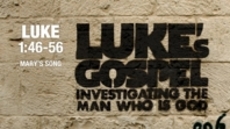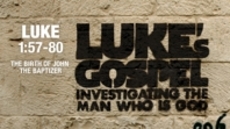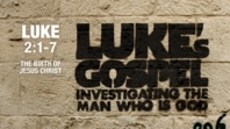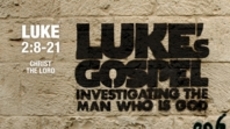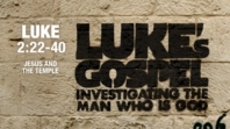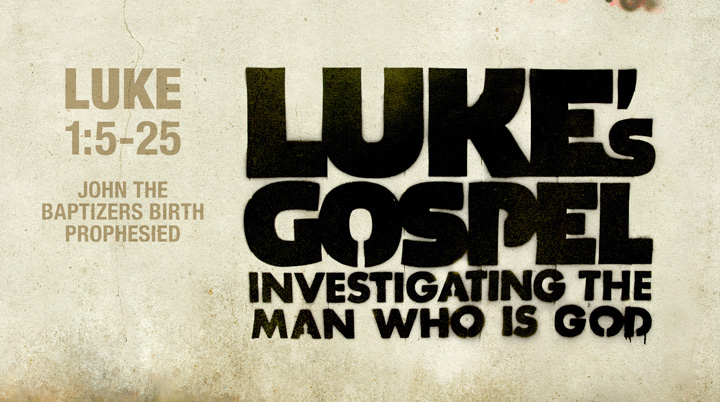
Can’t see the video? Download and install Flash to be able to view. Get Flash Here
John the Baptizer’s birth was prophesied in Malachi 3:1; 4:5–6. Then, after 400 years of silence, during the time of Herod “the great,” in the city of Jerusalem, at the Temple, we meet Zechariah, a priest, and his wife, Elizabeth. They were old, barren, poor, and righteous. Zechariah wasn’t a big deal; he was no one from nowhere doing, in the sight of the world, nothing. He was finally picked to go inside the Temple and burn incense, representing our prayers to God. While inside, the angel Gabriel appeared to Zechariah and told him that his prayer was answered and he would have a son who would be great. The baby, John (meaning “God is gracious”), is named by God and filled with the Spirit from his mother’s womb. But Zechariah did not believe the angel, so he was made mute. The couple returned home, Elizabeth conceived, and for five months she stayed home, praising God for taking away her reproach, or shame and disgrace, among the people.
5 In the days of Herod, king of Judea, there was a priest named Zechariah, of the division of Abijah. And he had a wife from the daughters of Aaron, and her name was Elizabeth. 6 And they were both righteous before God, walking blamelessly in all the commandments and statutes of the Lord. 7 But they had no child, because Elizabeth was barren, and both were advanced in years.
8 Now while he was serving as priest before God when his division was on duty, 9 according to the custom of the priesthood, he was chosen by lot to enter the temple of the Lord and burn incense. 10 And the whole multitude of the people were praying outside at the hour of incense. 11 And there appeared to him an angel of the Lord standing on the right side of the altar of incense. 12 And Zechariah was troubled when he saw him, and fear fell upon him. 13 But the angel said to him, “Do not be afraid, Zechariah, for your prayer has been heard, and your wife Elizabeth will bear you a son, and you shall call his name John. 14 And you will have joy and gladness, and many will rejoice at his birth, 15 for he will be great before the Lord. And he must not drink wine or strong drink, and he will be filled with the Holy Spirit, even from his mother's womb. 16 And he will turn many of the children of Israel to the Lord their God, 17 and he will go before him in the spirit and power of Elijah, to turn the hearts of the fathers to the children, and the disobedient to the wisdom of the just, to make ready for the Lord a people prepared.”
18 And Zechariah said to the angel, “How shall I know this? For I am an old man, and my wife is advanced in years.” 19 And the angel answered him, “I am Gabriel. I stand in the presence of God, and I was sent to speak to you and to bring you this good news. 20 And behold, you will be silent and unable to speak until the day that these things take place, because you did not believe my words, which will be fulfilled in their time.” 21 And the people were waiting for Zechariah, and they were wondering at his delay in the temple. 22 And when he came out, he was unable to speak to them, and they realized that he had seen a vision in the temple. And he kept making signs to them and remained mute. 23 And when his time of service was ended, he went to his home.
24 After these days his wife Elizabeth conceived, and for five months she kept herself hidden, saying, 25 “Thus the Lord has done for me in the days when he looked on me, to take away my reproach among people.”
The Holy Bible, English Standard Version copyright © 2001 by Crossway Bibles, a publishing ministry of Good News Publishers. Used by permission. All rights reserved. Quotation information.
Howdy, Mars Hill. We will be in Luke chapter one continuing our series, “Luke’s Gospel: Investigating the Man Who Is God.” Today we’ll be in Luke 1:5-25. But, we will begin in the last book of the Old Testament, the book of Malachi chapters three and four. I know you were all waking up this morning wondering about Malachi. So, I thought I would address that first.
We’ll pray and get to work. Father God, I do pray that our time will be pleasing to you, profitable to us, and that we would hear from the Holy Spirit in Jesus’ name, Amen.
All of human history is about Jesus. God is a sovereign God. He rules over all times, nations, languages, cultures, races, classes, and genders of people. He is working out everything according to his plan. He is not the author of sin; he is altogether good. But, he is so powerful that he will even use sin for his purposes. He did that, for example, allowing Judas to betray Jesus so that our sins might be forgiven. And, this doctrine of sovereignty works itself out in what we like to call the providence of God, that he loves us, that he is actively at work for good in the lives of all of his people.
And, one of the ways that we see this is through prophetic promises, where God who is sovereign over and controlling of the future in advance through his servants the prophets predicts the future; he predetermines the future. And, one of those occasions is the last book of the Old Testament, the Book of Malachi chapters three and four. This will be God’s final word until we pick up the story in Luke chapter one. And it is God’s anticipatory and preparatory word for his people of what is to come.
So, Malachi 3:1, written 400 years before Jesus is born, the sovereign God of the universe says, “Behold, I send my messenger, and he shall prepare the way before me.” So, God is speaking saying, I am coming and before I come into human history a messenger, a preacher, a prophet will come. And he will proclaim and herald my coming and he will inaugurate my unveiling. “And the Lord,” ultimately that is the Lord Jesus, “whom you seek will suddenly come to,” where? “his temple; and the messenger of the covenant in whom you delight, behold, he is coming, says the LORD of hosts,” the God who rules over the angels and the demons.
This is an Old Testament prophecy that John the Baptizer is coming as the messenger to prepare the way for the coming of the Lord Jesus Christ. And all of this would happen around the temple, which was ultimately, finally destroyed in 70 AD, meaning our Jewish friends who are waiting for a Messiah have missed him. He came to the temple and they are waiting in vain. There is no temple because we don’t need it anymore. We have Jesus and all of its ministries have been fulfilled.
Malachi 4:5-6, then tells us this, “Behold, I will send you Elijah the prophet before the great and awesome day of the LORD comes. And he will turn the hearts of the fathers to their children and the hearts of children to their fathers, lest I come and strike the land with a decree of utter destruction.” What he says is, here are the next events in human history. A messenger is coming to the temple before 70 AD, a prophet proclaiming repentance so that people will be ready for the coming of the Lord Jesus Christ. And one of the effects of his ministry will be to turn in repentance father’s hearts to love their children and children’s hearts to love their father.
And, then there are 400 years of silence. No book of the Bible is written, no prophet speaks. Some begin to wonder if God’s provision has left the nation. One generation to the next becomes a little more stiff necked, hard hearted, and cold. People aren’t walking with God as they ought and they should. There are a remnant few who are seriously devoted to the Lord. But, it’s 400 silent years.
And then, everything begins to change in Luke 1:5. And we read this word: “In the days of Herod, king of Judea,” now Herod here is called Herod the Great. And King of Judea would mean that he ruled over the region of the Jews. He’s not the Caesar, he’s not Augustus Caesar. He’s not the highest-ranking governmental official. But he is a provincial king and he would’ve been called King of the Jews, a title that was later mockingly given to Jesus Christ. He is a very curious man indeed.
He comes from the family line of Esau. Remember the story of Jacob and Esau in the Old Testament? These boys are duking it out from the beginning. They get out of the womb and they fight and out of them come two nations, the Israelites and the Edomites. Throughout the Old Testament, the Edomites keep trying to kill the Israelites. It culminates with Herod trying to kill Jesus. Herod is a family name; it’s a lineage of Edomites. Herod hears that Jesus is born and he’s going to be King of the Jews and he wants to be king of the Jews. So, he’s the one, we read in Matthew’s Gospel, who orders the slaughter of the first-born sons and there’s much weeping.
This conflict is very severe. Herod is the quintessential Edomite. Jesus is true Israel. This is not a great time for God’s people. It is a time of great success for the Roman government that rules over God’s people. But this man is not a godly man. He doesn’t love God or God’s people. He works for the Roman government, he’s a puppet king. All they care about is safe passageway on the roads for their soldiers, good income for their coffers. They don’t care what god you worship as long as you pay taxes. That’s all they care about.
And this man Herod he is, he is amazingly maniacal. He’s brilliant and evil. So, he’s the worst kind of evil. He is one of the most legendary architects of civilization in the history of the world. If you ever have an opportunity to go to Jerusalem, much of what you’ll see, even 2,000 years later, including in the outlying areas such as Caesarea, will be the remains of things that Herod had built. This guy raised unbelievable amounts of money. He built epic structures, temples and places of worship and palaces and cities. In one location, he actually built in Caesarea a harbor where there was no harbor. He invented quick-dry cement with ash from Italy and also sand that would be floated out in boxes and dropped. And, with the water, it would turn into quick-dry cement and he would stack them and he built a harbor so hundreds of ships could take cargo out and bring money in and he could be even more rich and famous.
The guy was brilliant and evil, unbelievable. So much so that he murdered his own wife, he murdered two of his own sons. I mean, I have three sons, I can’t even fathom a man who murders his wife and his sons. Because he was so committed to control, he was such a paranoid ruler, that he thought that they might abdicate his role and so he had them murdered. Later in life, he went a bit crazy. And it is reported that at night he would wake up, forgetting that he had murdered his wife, and call out for her and be angry at his servants because they weren’t bringing his wife that he murdered.
He’s an unbelievable man. He murdered lots of people. He was so paranoid and controlling that he would send out spies to eavesdrop on the conversations of people in the cities. He outlawed free speech and free assembly. You weren’t even allowed to get together and talk about him, and if you did, he just killed you. He would dress up in peasants’ garb and he would go out to eavesdrop on the citizens. It got to the point where he just murdered so many people and political opponents that there was a great public outcry.
And, he is a man who enjoyed many palaces. He had safe houses and he had places of refuge and he built multiple palaces for himself. I’ll show you one of the ruins. This is from Caesarea. This is some of the ancient ruins; when we were there visiting we took these photos. And those are some of the columns from his palace. Again, he had multiple palaces. This one is on a beautiful saltwater shore. And nearby there was a freshwater spring. And he used it to construct for himself a freshwater pool on a saltwater beach. This was 2,000 years ago; this is MTV Cribs, Roman style. And you could see where he had carved out in the stone a pool; you could still see the outline of his freshwater pool. And so, what he decided was, “I can’t just keep killing people, I’d get in lots of trouble and people get angry.” So, what he’d do if he was unhappy with you, is he would say, “Why don’t you come to my house in Caesarea, stay with me at my beach house and we’ll have a nice swim party at my pool.” And then, people would accidentally drown. Lots of people drowned in this pool. And then there would be public outcry, “You need to stop murdering people!” He would say, “I don’t murder anyone; I just have a very dangerous pool and friends who can’t swim.” [Laughter]
That was Herod, a really bad guy, a really bad guy. Now, what Luke tells us here in Luke chapter one is that all of this happens in the days of Herod, king of Judea.
Where does it happen? The city of Jerusalem, one of the most important cities in all of history and the most frequently mentioned city in all of the Bible, the city of David. Jerusalem is an amazingly important city in biblical and redemptive history. It’s a city that’s about 3,000 years old at present. If you were to go there and to investigate, you would recognize that there are actually ten layers of civilization stacked one on top of the other. They’re continually unearthing through archeological dig various places and objects and they’re learning things all the time.
And Jerusalem is the place that God appointed for his worship and the place for world evangelism. That’s why Jesus says we’re to be witnesses from Jerusalem, Judea, Samaria, ends of the earth. Jerusalem is to be the place where the Gospel takes root and goes forth from. And the worship of God is enjoyed by God’s people and then it spreads to the nations of the earth.
And in Jesus’ day, it was a huge town, maybe 100,000 people. And that doesn’t seem like a big deal to many of us who are familiar with modern urbanization. But, when you read of other cities and towns in the Bible, you read that Peter’s from Capernaum, or Jesus is from Nazareth. You go there, these are small rural towns. These are towns that have 50 or 100 people. If a few community groups get together, that’s as big as Jesus’ hometown. And so a town of 100,000 that was an enormous city.
And people would long to come there, those who were worshipers of God, they would want to make their incredible life journey to Jerusalem. And it would sometimes, depending upon where they were coming from, take days of walking in 100-degree heat. It’s a very strong devotion and commitment to make that trip. And Jerusalem really is a city that is set on a hill. You hear Jesus say, in Matthew 5:14, that the church is to be a city on a hill. Well, that’s Jerusalem, it’s a city on a hill that belongs to God and everyone gets to see it. And Jerusalem is a city set on a hill and it’s carved almost entirely out of rock.
And, to this day, as the Jews speak of Israel as it would be in the days of old, they don’t speak of “going to” Jerusalem they speak of “ascending to” Jerusalem because physically you would be walking up toward Jerusalem. And, as you walked, you would sing and your voice would go up to God. And your heart would go up to God. And the impression was that you were going up to God to meet with him. If you’ve ever read the Psalms you will read the Psalms of ascent, those are the Psalms that they would sing as they would walk into Jerusalem and they ultimately walked up the steps into the temple.
I’ll give you a modern-day picture of Jerusalem. We shot this from the Mount of Olives. We’ll show you some footage on this in the coming weeks. This photo is actually snapped off the RED camera. And it is from the Mount of Olives. Right in front of us is what’s called the Kedron Valley. And then, this is a picture of Jerusalem set up on the hill, Old Jerusalem, the City of David is contained within the walls and then there is the expanse of the rest of Jerusalem as it is at present. And so this is the view from the Mount of Olives where Jesus prayed and certain things transpired. And it says that Jesus will return to basically the place where we took this photo, that he’ll split it right down the middle, I hope right through the Dome of the Rock. And then, he’ll level everything out. And then the new heaven, the new earth, the New Jerusalem will come down out of heaven and you and I, who belong to God, will spend forever in the New Jerusalem. And it is a city that is not built by human hands. Nothing there is to our glory. It’s all gifted to us by God.
And so, it all transpires here in Luke 1 in Jerusalem, in Jerusalem. So, it’s in the days of Herod after 400 years of silence. It is when they’re under the governance of a crooked Roman puppet king who hates them but uses them for money and his own glory. It’s during one of the most ambitious re-buildings of any civilization in the history of the world. And what Herod does is he rebuilds the temple.
So, from the days of Herod, to the city of Jerusalem, to the location of the temple. If we were watching a film, the camera would be panning in to the temple; that would be the setting. The temple plays a prominent role throughout the Bible. It’s introduced in the first opening chapters of the Gospel of Luke. And then the story moves to Nazareth, Jesus’ hometown, Capernaum where he’s with Peter. And then ultimately the book comes back to Jerusalem. So, from Jerusalem, away from Jerusalem, back to Jerusalem; from the temple, away from the temple, back to the temple, that is the chronology of Luke’s telling of the story of Jesus’ life.
Let me tell you a little bit about the temple. The temple is very significant. There was a king named David. And God gave him the plans to construct the temple. And he was an adulterer and a murderer, so God did not allow him to construct the temple. That job was given to his son Solomon. Solomon did, according to God’s decree, oversee the construction of the temple. God’s glory fell on it. God’s people worshiped around it and there was ebbing and flowing of spiritual devotion over the course of many years. It fell into disrepair and had a renewal in the time of Josiah.
Ultimately the temple was destroyed, which is an absolute crisis because Malachi says when Jesus comes he’s coming to the temple. And so, a second temple was constructed by Herod. It’s called the Herodian Temple. And what’s amazing is that Herod is a godless man and God in his providential sovereignty uses Herod to build a temple. And this is how God works. He will even use non-Christians and evildoers often times even with selfish motives, not that he commands them to sin, not that he blesses their sin, but he uses everything for good because he’s that good.
It’s amazing as you go there, to see all that Herod built and how it was all used to bring Jesus into the world, even though he himself tried to have Jesus murdered as a little boy. And Herod was such a megalomaniac that everything he built was built to incredible cost and expense. He spared no expense with anything that he built. And he was such an egomaniac that every single stone for all of the buildings that he constructed had his logo on the stone. We went under the archeological ruins along where the temple previously was before it was destroyed in 70 AD for the last time, the second temple was destroyed, and they’ve unearthed some of the original stones from the wall that Herod had built. And there it is – every stone is cut 36 feet by 12 feet by 12 feet, weighing the same as a Boeing 747, with Herod’s logo on every single one. So, wherever you walk you’re like, that’s amazing. Herod, Herod, Herod, it’s like the Nike Swish is on everything. The whole city is dedicated to Herod, including the temple.
And, I’ll show you a picture of how the temple appeared in the days of Herod. It’s from the ESV, English Standard Version, Study Bible. They did us a great service. They actually hired architects to draw scaled drawings of what it looked like. If you go there today, nearly all of this is destroyed. Jesus said it would be destroyed. And he was right. We don’t need it anymore. We have Jesus. So, we don’t go there, we go to Jesus, just so you know. But this is what it looked like in the days of Herod. So, on top of the city on a hill, there is the temple, the temple courts, the square footage is about twice the size of Solomon’s temple. So, Herod blew out more rock. Everything with Herod’s got to be bigger and better. And one of the reasons that he did that is, God’s house, the Holy of Holies, the temple, is there, and right next door is Herod’s house. This man had a very high self-esteem. There are two people living in this neighborhood, God and Herod. “God, you can rule spiritually. I’ll rule politically and financially. People can come here to worship you, but they need to see my logo on all of the stones. And on their way out, they can buy my goods and fill my pockets.” You wonder why Jesus went to the temple and had a complete freak-out, throwing over tables, saying, “This is my Father’s house, not your house.” Well, it’s because Herod set up shop next to Yahweh. Jesus didn’t like that.
So, why do people want to go to the temple in the days of Jesus? There are five reasons. Number one, it’s a place between heaven and earth, because, number two, it’s the place where God’s presence dwells in the Holy of Holies. So, God’s glory and presence deal most heavenly and weightily in the Holy of Holies, the centerpiece of the temple. And so, it is a middle point between heaven and earth. It’s a mediator point. It’s as close on earth as you can get to heaven and it’s heaven coming down to be with us. Number three, it is where God’s people would come to meet with him. So, you would go there to pray and to sing and to meet with God. That’s the closest you could get to God. And number four, it’s where sin was atoned for you. You’d bring sacrifices, blood would be shed, particularly on Yom Kippur, the Day of Atonement, what the Jews simply called “the Day.” Where sacrifices would be offered because without the shedding of blood there is no forgiveness of sin because the wage for sin is death, and so these animals substituted themselves, foreshadowing Jesus, who had come to substitute himself and die in our place for our sins.
And number five, it’s where God’s people would come together to worship him. If you lived in one of these small towns, you were likely illiterate and very poor. If you lived in a home 500, 600, 700 square feet, part of that was inhabited by your livestock. You’d get together in your synagogue, 20, 30 people. But then, when you went to Jerusalem, you would see the city on the hill and your heart would be filled with joy. And then, you would hear everyone else as they were entering into Jerusalem singing the Psalms. These are people who are singing to your God. And you would join them singing the Psalms. And as you got closer, you would go into one of the ceremonial baths that have been excavated and they’re still there, and you would ritually cleanse yourself. And you would wear white like the church does in Revelation and like a bride does on her wedding day, because no matter what she’s done, in Christ she’s pure. And then you would sing the Psalms of ascent and you would go to be with God’s people. And it wouldn’t be just 10, 20, or 30 of you, it would be thousands of you. You’d look around and see all these people who were going to meet with God. You’d never sung with that many people. You’d never heard that many voices. And your heart and your mind and your soul and your body and your voice are ascending. That’s why they went.
In the days of Herod, in the city of Jerusalem, at a place called the temple. Luke 1:5-7: “In the days of Herod, king of Judea, there was a priest named Zechariah,” same name as my son, “of the division of Abijah. And he had a wife from the daughters of Aaron, and her name was Elizabeth. And they were both righteous before God, walking blamelessly in all the commandments and statutes of the Lord. But they had no child, because Elizabeth was barren, and both were advanced in years.”
It’s the days of Herod the Great. We meet Zechariah, he’s nobody, and Elizabeth, she’s Mrs. Nobody. Here’s what we know about Elizabeth. She’s from the line of Aaron so she comes from a ministry family, generations of ministers. Her name means, “God’s oath.” Zechariah’s name means, “the Lord remembers.” He is the equivalent in those days of a pastor. He’s a priest. But, he’s not a big deal priest. He’s from a small little town, think 50, 100 people, not a big deal. At synagogue, 10, 20, 30 people show up, not a big deal.
Here’s what we do know about this couple. Number one they’re old. That’s what it says. So, how old is old? Well, we don’t know how old they are, but in that day the Levites, according to Old Testament requirements, had to retire from ministry at 50. So, anything over 50 still in ministry is old. He’s a priest. He’s not forced to retire at 50 like the Levites are. But, let’s say he’s 60, 70 years old. He’s old. She’s old too.
Number two, we find out that they are barren. That means they can’t have any children. This is like Abraham and Sarah. They’re beyond childbearing years, unable to have children. Emotionally this is devastating. Financially this is dangerous. Unlike our day, there were no hospices, there were no care centers, there was no social security, so, if you got old, your children in general and your sons in particular, they looked after you. No sons, great danger.
What else we know about them is they are poor. He’s not a big priest working at the temple in Jerusalem. He’s a simple priest out in the middle of nowhere with a little flock working, probably a job. So, if you think about it, if you go to some very small rural town, mainly seed farmers, you see a little church that seats 50 and it’s half-full for worship. And the pastor there’s a real simple guy with a barren wife and they’re both in their 60’s or 70’s. And he’s working a fulltime job. That’s Zechariah. Isn’t that amazing? He made the Bible. You know why? They loved God. They served God. They walked with God.
Now, here’s what they didn’t do. They didn’t idolize children. See, let me explain idolatry. Worship is where we love, serve, honor, obey, glorify God our Creator, enjoy and steward created people and things. Idolatry is the inversion, where we worship created things rather than Creator God, Romans 1:25 says. And so, we take good things, we make God things out of them, that’s a bad thing. That’s idolatry. And so for some it’s food, or money, or power, or fame, or sex, or glory. For many it’s family. The great evangelical idol is family. “Our church is family friendly. Come here you’ll have a great church. God will give you children. They’ll all be Christians. You’ll love the Lord. This is a family-safe, family-friendly church.” Is that a bad thing? No. But, the purpose of the church is that Jesus would be glorified. Jesus doesn’t exist to give us our idol, the perfect little family. Our family exists to worship Jesus, the perfect God. When that inversion happens it destroys the family, it destroys the family. Just take your son or daughter and tell them, “Here’s all I need you to do. Give me security, significance, an identity, meaningful future, be the cause that I live for, never disappoint me, don’t fail me, be perfect so that I can have joy as I worship you glorifying me.” And see if the kid doesn’t crumble under the pressure or rebel against you just out of spite. If you really love your kids, worship Jesus not them, so the pressure can be off and they can be sinners who serve Jesus as well.
And what happens is, with some couples when they don’t get a baby – is a baby a bad thing? No, a baby’s a good thing. Alright, we got five kids, love them with all my heart. Love being a dad, love, love, love being a dad. But what if God doesn’t give you children? They are a blessing. What if he doesn’t give you children? What do you do? Do you curse God? Do you find another God? Do you know what some people do? They sin. You know what this couple didn’t do. They didn’t sin. Number one, they didn’t get a divorce. In that day, it was always assumed if there was infertility, the assumption was the wife is barren. That gave the husband legal grounds to divorce her and go get another wife. Did Zechariah divorce Elizabeth? No, they stayed married and loved one another. Number two, some people go out and they commit adultery, at least they did in that day, trying to impregnate someone else so that they could have a baby. Remember Abraham and Sarah? Sarah cooks up this idea, we’re old and barren, just like this couple is. And rather than trusting God as this couple does, Sarah says, “You know, it’s not working. God hasn’t shown up, hasn’t given me a baby. There’s this gal over here. Why don’t you go sleep with her Abraham, impregnate her? That way we can give birth to another son who can grow up and hate us and then everybody can take off their shoes at the airport.” And that’s how it all goes. [ Laughter ]
Seriously, that’s how it all comes together. [ Laughter ]
That’s all theologically accurate. [ Laughter ]
Or thirdly, some people just get bitter. “Oh, you won’t give me a baby, well, then I’m going to hate you. I’m going to despise you. I’m not going to worship you. I’m not going to serve you. I’m not going to be one of your devoted people anymore.” Maybe in that day they go to a fertility cult or find a different religion. They didn’t do any of that. Here’s what they did do. They worshiped God. The accepted God’s providence in their life, “God, you do open and close the womb. We believe the Bible. If you give us a baby that would be wonderful, we’d love to be parents. But if not, we’re still going to love you and serve you.” And they did. They’re still in ministry. They’re still worshiping. They’re still praying. They’re still serving. And, they’re still asking God for a baby. Is it okay to keep asking? Yes. It’s no problem at all. They keep asking.
Zechariah’s a nobody who lives nowhere. What’s he doing? Well, in the eyes of Herod and the Romans, nothing. Verses eight through ten, “Now, while he was serving as a priest before God when his division was on duty, according to the custom of the priesthood, he was chosen by lot to enter the temple of the Lord and burn incense. And the whole multitude of the people were praying outside at the hour of incense.”
Here it is. We’re dumb Gentiles. We read that we’re like, “A priest, wow!” Really not a big deal. Not a big deal at all. There were 18,000 priests, that’s not a big deal. They were priests, yeah everyone is. It’s not a big deal. He wasn’t a big priest at the temple. He was a little priest down in the woods. They subdivided the priesthood of 18,000 into 24 divisions, 750 men each. And they’d each get to go to Jerusalem for one week, two times a year to minister at the temple, two weeks a year. And they would all come together and they would roll dice to see who got to do the big job. The big job was, go in, throw some incense on the coals, and say a prayer. That was it. Once you got to do it, you were done for life. They declared you holy and blessed. You never got to do it again. This is it. This is your Super Bowl, this is your big day.
And the people would be outside praying, it says, like this. They’d be down on their knees with their hands out praying while the priest went in to offer the incense and the prayer. These people are thinking, “He better hurry up. This is marble. This is not comfortable.” So the whole goal was, be one of those quick priests. And that’s how it would work. And every year, Zechariah, for I don’t know how many years, maybe 40, 50 years, he goes all the way to Jerusalem, they roll the dice: loser, loser, loser, loser, never gets picked. He’s like you in gym class, never gets picked. He’s getting very old now. “Will I ever get picked?” Some guys never get picked. And see, it’s God, Proverbs says, who oversees the roll of the dice. And then one day, he’s an old man, there he is. They roll the dice: “Zechariah, it’s your turn.” It’s his big day.
I’ll show you an architectural rendering of where he went from the ESV Study Bible. There was this portion of the temple. He would’ve entered in the side. He couldn’t go all the way to the Holy of Holies because he’s not the Great High Priest. But, he would get as close as a regular priest could get to the Holy of Holies, the very presence of God on earth, separated by a veil that was torn from top to bottom when Jesus died because the Holy Spirit is now present with us all over the earth. And here was his big moment. The old man walks in. Here’s what he did. This is frankincense and myrrh. He would’ve put it on the coals like this. [ Silence ] And the incense would burn.
Now, what incense is symbolizing in Scripture is prayer. See, Revelation talks about a big bowl that’s in the presence of God. And that big bowl, Revelations says, is filled with the prayers of God’s people. When you pray, think of it like that. It goes into the presence of God and it ascends to him and it smells sweet to him. What a glorious picture of prayer. Ever wonder why Christians of certain traditions will light incense? Sadly, sometimes they don’t know. But biblically, it’s supposed to remind us, “Oh, when I pray, my prayers go up to God and it’s sweet to him.”
So, here’s Zechariah’s big moment. He comes in, one shot deal, drops his incense, closes his eyes, prays, I believe, for two things: one, God please deliver our nation, send the one that Malachi promised, send our Savior. Get us out from Herod. And two, God, please give me and Elizabeth a baby like you did Abraham and Sarah. Amen.
And he opens his eyes. Here’s what happens. “And there appeared to him an angel of the Lord standing on the right side of the altar of incense.” Woo, it’s a big day. I mean, here’s his whole life: drop the incense. See, for him, that’s it. This is the big deal. “I’ve done it all, wow.” An angel shows up. It’s going to get good. “And Zechariah was troubled when he saw him, and fear fell upon him.” We’re lucky this old guy didn’t die, you know, like, “Lord, Amen, ooh.” [Laughter]
“But the angel said to him, ‘Do not be afraid Zechariah for your prayer has been heard.’” What have you stopped praying about? So you say, “Well, he hasn’t answered.” Yeah, he always answers: yes, no, and later. He just has different answers. Zechariah kept praying, kept loving, serving, worshiping God, adoring his wife. God hadn’t answered “yes” yet, God hadn’t answered “no” yet, God kept answering “later.” And in that moment, God said, “Today, the answer’s yes.” You should keep praying.
“‘Your prayer has been heard, and your wife Elizabeth will bear you a son, and you shall call his name John,’” which means, “God is gracious.” That’s true. The angel shows up. Angels are mentioned 23 times in Luke. I get asked this question a lot. A television reporter recently asked, “Do you believe in Satan and angels and demons?” Yes, because we believe in the Bible, and the Bible talks about angels, who are ministers and messengers. They speak and serve on behalf of God. They’re created beings. Totally believe in them. We also believe in fallen angels, demons, and Satan their leader. That’s why we don’t believe that everything that’s spiritual is good. You need to test the spirits like 1 John says because some are angels and some are demons. Yeah, we believe in all of that. We believe in the supernatural, miraculous, healings, supernatural gifts, all of it, it’s all in the Bible. We receive it all as truth and rejoice in it.
And the angel shows up and says, you’re going to have a boy. Name him John, which means God is gracious. He goes on to say, “‘And you will have great joy and gladness.’” Man, don’t you – I get so excited for Elizabeth and for Zechariah. And I know it didn’t happen like today. This was a while ago. But just thinking about it, I’m really excited today. I’m so happy for them. Don’t you love seeing God show up and love somebody and serve somebody and provide for somebody and rejoice with those who rejoice? Don’t you love that? [Applause] It’s wonderful. It’s so good to see.
“‘And you will have joy and gladness, and many will rejoice at his birth, for he will be great before the Lord.’” Oh, this is good. Herod is the mighty king. He is Herod “the Great.” The angel says, “Not really. John will be great. Herod will make more money, build more buildings, subjugate more people, have more followers. But, he won’t give his life to humbly serving God. Your son will. And he’ll be the great one.” Friends, don’t let greatness be defined by the standards of the world and the people like Herod. If you love God and serve God and accept his providence in your life and walk with him faithfully, being and doing whatever he’s appointed for you, you are great in the sight of God. And the truth is, it’s only the sight of God that really matters.
Zechariah is no one from nowhere doing, in the eyes of the world, nothing. And God says, I heard your prayers. Here comes your son. He will be grace to you, amazing. He will be great in the sight of God. May that be said of us all and our children and our children’s children. That they were great in the sight of God.
“‘He must not drink wine or strong drink.’” Let me explain this. We at Mars Hill do believe that it is acceptable for Christians to drink under certain conditions. Number one, they don’t get drunk. Number two, they don’t cause anyone else to get drunk. Number three, they don’t disobey the law. Within that, there is then freedom to either consume or not consume alcohol legally and in moderation. In some places, this is very controversial and they start arguing, and their reasoning is oftentimes very convoluted. What this means is, we have certain freedoms in Christ that we shouldn’t let anyone take away, through legalism and religion and rules and moralism. But, it does mean that we can give away that freedom, out of conscious and conviction and compassion. And what God is saying is, “Zechariah, I want you to raise your son and tell him to give away his freedom. He is biblically free to drink but I am binding his conscience.” For this man, he is not permitted to drink. No wine and no hard alcohol of any kind.
Now, let me say this. Some of you need to give your freedom away. Some of you shouldn’t drink at all. You’re prone toward alcoholism, abuse. We don’t know why God forbid John from consuming alcohol. But it was good and it was right for John. So, some of you are immature at Mars Hill and you’ll hear of your freedom in Christ with alcohol and you’ll say, “Well good, then I get to drink.” No, you have the freedom to, but you need to pray and ask God what his convictions would be for you personally. God may want some of you – and I’m assuming the Holy Spirit will now speak to some of you saying, “That’s what I want for you.” You shouldn’t be drinking at all, for whatever reason, health, conscience, family, witness, personal conviction, calling from God, a ministry opportunity, proclivity toward addiction, whatever it might be. And for those of you who give away your freedom, those of us who keep our freedom should not judge you. You should not judge us. We should love one another. It is entirely possible that Zechariah was a man who would sit down and have a glass of wine with dinner and his son John would not. As they loved one another, we should love one another. And our unity is around Jesus, not around these things. But I want some of you to really consider whether or not God would have you to forgo some freedom based upon his calling on your life and his binding of your conscience.
“‘He must not drink wine or strong drink, and he will be filled with the Holy Spirit, even from his mother’s womb.’” This is amazing. We are a pro-life church. On record, I said it in Seattle, I’ll say it again. We are a pro-life church. [ Applause ] Some of you say, “I didn’t think we were political.” Now, again, this is biblical not political. You say, “Well, I didn’t think we were political.” We’re not political, we’re biblical. People are made in the image and likeness of God. They’re endowed with dignity, value, and worth. And God honors them, God cherishes them from their mother’s womb.
I didn’t hold this position as a non-Christian. I was absolutely supportive of abortion, population control, and what is called Malthusian eugenics. And then I met Jesus. And I started reading the Bible and I realized that I was wrong. So, you’re welcome to be here if you disagree with me. But, our encouragement would be for you to think through your position, because it is insane. [ Laughter ]
I had a discussion earlier today with a very nice non-Christian gentleman, came up to me holding his son, saying, “I disagree with your position on abortion. I think it’s okay to kill babies.” I’m like, “You’re holding one. Cover his ears and we’ll finish our conversation.” It just – the illogic is unbelievable.
Now, here’s why we are a pro-life church: because God is a pro-life God. I’ll make this as clean as I can. See, the main reason why you would be pro-choice is, you want to have sex outside of marriage, not be obligated to that child, and so you would rather murder them than repent. It’s really not that complicated. Some people say, “Oh, there’s minority cases for rape and incest.” Let’s just talk about the vast majority of cases. Let’s deal with all of that and maybe we can quibble over some of the complicated details and other scenarios. But that’s life, life nonetheless, and we’re prolife, I’m prolife nonetheless.
What we see here is, God says there’s a baby in Elizabeth’s womb. You’re going to read this coming up in the next few weeks, that the baby leapt in the womb of a mother. That same word for “baby” is the same word for “children” who gather around Jesus later and sing “Hosanna, Hosanna!” So, the baby in the womb is the same as a five-year-old kid who sings songs to Jesus. They’re all children.
And here, we find that this child in Elizabeth’s womb has a name. His name is John. Not only is his name John, he’s filled with the Holy Spirit from his mother’s womb. I don’t know how you could get a stronger argument for personhood than: named by God, filled with the Holy Spirit, set apart for ministry, still in the belly. That, to me, seems like a pretty good case for personhood. And the holocaust of abortion is completely unacceptable. And as many as 25 percent of all abortions are performed by professing evangelical Christian women, completely unacceptable sin, it’s murder. It’s murder. Jesus died for all sin. And he can and will forgive you. But rather than arguing over the political point, repent of the action.
And I love the fact that God can save a baby and fill them with the Holy Spirit from their mother’s womb. I’ll tell you why. The holocaust of abortion, roughly one out of five pregnancies end in miscarriage, some of you are struggling with infertility, you keep having miscarriages. My wife and I have five beautiful healthy kids. We had one that was miscarried. It was devastating. And I find so much comfort that God knows the baby from the womb. God names the baby from the womb. God can even sovereignly elect, predestine the baby from the womb, can put the Holy Spirit in the baby, and regenerate the baby in the womb.
See, there are two views of salvation, Arminianism and Calvinism. We call them wrong and right. No, I’ll explain. [ Laughter ] I’ll explain the way this works out. What generally tends to happen is those who are Arminian will say, “Well, it’s the most compassionate position.” No, it’s not. Because their assumption is, you need to be born, you need to grow up, you need to have a cognizant mental capacity to receive the news of Jesus, you need to personally make a decision of the will to be saved. And, if that’s the case, then the unborn, the mentally incompetent, those who were aborted or miscarried, there’s no hope for them whatsoever. If, however, it is God who chooses whom he will save in his sovereign providential foreknowledge, God could even choose to save a miscarried baby, an aborted baby. You know, as a woman’s going to a clinic to murder her child, God could name that baby, elect that baby, save that baby, send the Holy Spirit to that baby, and, when she murders that baby, hold that baby. That’s why the Bible says God’s a what? Father. I love that. I love that God is that good. I mean, it’s beautiful, really, I mean, even in this moment just thinking about it, that God would be like that.
John will be filled with the Holy Spirit from his mother’s womb. God’s decided to save and love and call John. “‘And he will turn many of the children of Israel to the Lord their God, and he will go before him in the spirit and the power of Elijah.’” Your boy, just like the Holy Spirit filled Elijah, he’ll fill your boy. Just like Elijah was a prophet, your boy will be a prophet. This is an amazing day. Zechariah’s big moment was drop the incense, smell it, yeah. [ Laughter ] He wasn’t planning for this much grace.
He’ll “‘turn the hearts of the fathers to the children.’” There’s Malachi. “‘And the disobedient to the wisdom of the just, to make ready for the Lord a people prepared.’” Zechariah should have shut up, like a lot of guys. He should’ve just, “Woo!” and went home. Just, you know, “I’m done.” Instead, he starts talking. [ Laughter ]
“Zechariah said to the angel, ‘How shall I know this?’”[ Laughter ] “Well, let’s review. You’ve been asking for decades to have a baby. You won the dice rolling game today. It’s your one shot. The presence of God is right there. I’m an angel. You were in front of the incense, said give me a baby and so I came out and said yes. What else would you like?” “How do I know?” See, we laugh at the guy, but how many of us are like that? God says something and we say, “I don’t know. How do I know?” “All your sins are forgiven, past, present, and future. God’s love is unconditional.” “I did a bad thing.” “Yeah, he forgives that.” “Are you sure?” “Yeah, well it says all your sins.” “That one too?” “Yes, that’s what it means.” “Jesus is coming back.” “How do I know?” “Just wait.” You know what I mean? It’s just, it’s weird.
You can pray for something your whole life and when God says yes, you’re like, “seriously?” “Yeah, seriously.” “Are you sure?” “I’m an angel. Notice the wings, like, you know.”
“‘How shall I know this? For I am an old man,’” The angel’s like, “Really? Really? The bald head, the slouched back, the cane, the furrowed brow, I had no idea you were old. We angels, we’re not good at ages. You know, I didn’t know that.”
“‘And my wife is advanced in years.’” She’s no spring chicken says the Greek text. “And the angel answered him, ‘I am Gabriel.’” There are only two angels named in the Bible, Gabriel and Michael. You get one of them, big day. He says, “‘I stand in the presence of God.’” "You know where I just was, right over there. And God, Yahweh, Creator of heaven and earth said, go tell Zechariah, prayer’s answered. I mean come on here, Zechariah, prayer’s answered. “I don’t know, are you sure? Can we check with a higher authority?” Like, what, what, what, what?
You’re going to get a baby. “‘And I was sent to speak to you and to bring you this good news. And behold, you will be silent and unable to speak until the day that these things take place, because you did not believe my words, which will be fulfilled in their time.’” Like Sarah, he didn’t believe God, unlike Mary who will believe God.
The angel just says, “You’re going to shut up now. [ Laughter ] You, you don’t need to say anything. You just wait patiently and God will open your wife’s womb. And unlike a complete miracle devoid of a husband, as Mary will experience, God will use the natural relations between you and your wife to open her womb as he did Sarah’s and you will give birth to a son. And until then you can just go home and be quiet.”
And so many of us, what an, what an amazing word that is, sometimes you don’t need to say anything. You just need to shut up and wait. “I don’t know what’s going to happen, I’m really, I’m really freaked out, I’m totally freaking out.” Shut up and just wait. “Well what if he doesn’t -?” Back to my first point, come on. Sometimes God’s people, they talk too much and they wait too little.
“And the people were waiting for Zechariah.” So, they’re still outside like, “Where is the old guy? We’re trying to look holy and righteous and devout. We just walked from nowhere. We climbed up to the temple; we’re kneeling on the marble. Where is the old guy?” They’re still waiting. He’s taking a long time.
“They were wondering at his delay in the temple. And when he came out, he was unable to speak to them, and they realized that he had seen a vision in the temple. And he kept making signs to them and remained mute.” He’s supposed to come out, pronounce the blessing, say a prayer, lead in song; he comes out, eek, nothing. He’s doing mime. So, probably another priest steps forward, finishes things.
“And when his time of service was ended, he went to his home,” back to the little town. “After these days his wife Elizabeth conceived.” God opened her womb. Some of you ladies say, “Boy that would be awesome.” I tell you what we’ll do after service, come on up, we’ll pray for you, that God would answer our prayer and open your womb. “And for five months she kept herself hidden, saying, ‘Thus the Lord has done for me in the days when he looked on me, to take away my reproach among the people.’” We’ll revisit that but they just go home. What does Elizabeth do? Nothing for five months, I think she’s just worshiping God, rubbing her belly, making baby blankets, setting up the nursery and rejoicing that she has a mute husband. [ Laughter ]
I mean, I can see one hand on her belly, and she’s like, “Oh God, I thank you for this baby and the mute husband. All of my prayers have been answered. For nine months, I win every argument. Thank you, Lord.” [ Laughter ]
And, don’t you love this picture of Elizabeth? God loves her and he’s blessed her and he’s answered her prayer and she’s going to be a mom and he’s going to be a prophet and prepare the way for the coming of Jesus and fulfill the promises of Malachi.
And we’ll close with this and it is beautiful. And I rejoice at what God did for Elizabeth. Read this: “After these days his wife Elizabeth conceived, and for five months she kept herself hidden,” just praying, worshiping, thanking God, “saying, ’Thus the Lord has done for me in the days when he looked on me.” Nobody looked on Elizabeth. She’s nobody from nowhere married to a man who does nothing. She says, “You know what, God loves me and God knows me and God has kept his eye on me,” it’s true of all of us, “‘to take away my reproach among the people.’” It’s the doctrine of expiation. I wrote a chapter on it in Death by Love. It’s one of the most precious doctrines for us at Mars Hill.
See, all of this is to prepare for the coming of Jesus to deal with sin and shame. Jesus dies in our place for our sins. He’s our high priest. He is our sacrifice. He is our temple. He is our mediator. He’s where we go to have sin forgiven. He’s the one we gather around to worship. All of the ministry, the temple is fulfilled in Jesus. And sinners like Zechariah, those of us who have unbelief and sin, we come to Jesus to be forgiven of sin. And he also takes away shame for those that have been sinned against.
That word “reproach,” according to The Theological Dictionary of the New Testament, it means that Elizabeth was reviled, that she was disgraced. That means a person without grace. That’s what disgrace means, that she was abused and that she was shamed. She suffered emotional, verbal, and spiritual abuse for 30, 40, maybe 50 years. The other religious and smug, ungracious women would consider her cursed of God. So, they would spread rumors about her. “Oh, maybe she doesn’t love God. Maybe she’s not elect. Maybe there’s sin in her life, maybe her husband’s not as holy as he thinks he is. Oh, they think they’re priests and she’s a descendant of Aaron. Well, God didn’t even open their womb. He doesn’t even want them to multiply. How important could they be?” She would go to the well when all the other women would be drawing water, as was the custom, and we kind of get the idea that as they’re drawing water, they’re talking about her. She walks by and they give her that condescending, self-righteous, religious gaze. “Oh, did you hear that so-and-so is pregnant? Yeah, God has really blessed her and honored her.” They were just jabs at Elizabeth’s heart all the time, jabs of reviling, disgrace, abuse, and shame. Had she sinned? No. Had she done anything wrong? She wasn’t perfect, but we were told that she loved and served the Lord. Was God cursing her? No, he was just working out his sovereign plan; his answer was “later” and later finally came.
For those of you that are here and you’re like Zechariah, there’s sin, we want you to confess that to Jesus. This is all to prepare for the coming of Jesus. He died as a substitute in your place for your sins. And for those of you who are victims, you’ve been sexually abused, physically abused, verbally abused, you’ve been ripped off, cheated on, beat on, yelled at, you’re like Elizabeth. God comes to take away, today, at this moment, your reproach, your shame, your disgrace. He comes to take that on himself. It says when Jesus went to the cross he endured the cross, scorning its shame. Dear friends, Jesus wants to lift from you today all of that shame. He wants to take away your reproach so that you can do like Elizabeth did. You can worship, you can celebrate, you can enjoy him. Five months, she just worships God because she knows that God loves her.
Do you know that God loves you? For those of you who have sinned, I want you to give your sin to Jesus. For those of you who have been sinned against, I want you to give your shame to Jesus. And I want you all to worship as she did with joy because God is good. Amen? I’ll pray.
Father God, I thank you for this beautiful true story in the days of Herod in the city of Jerusalem in the location of the temple in the shadow of a false king was coming the King of kings. We thank you for the words of Malachi and that they were fulfilled in John, the grace of God. That’s what his name means. God, we rejoice in Zechariah and Elizabeth’s joy. I ask for those who are infertile or struggling, those who have been praying for a long time for hard things, that they would keep throwing incense on the coals, that they would trust that perhaps the answer is later, and that Lord God you would come and say yes to their prayers. We thank you, Lord God, that you forgive sin and that you lift shame, that you take an abused woman, as Elizabeth was, and you let her have unprecedented joy. I thank you that for five months, God, she didn’t say anything to anyone. She was just happy to worship you. May, by the power of the Holy Spirit, we experience that right now in Jesus’ name, Amen.
[End of Audio]
Note: This sermon transcript has been edited for readability.
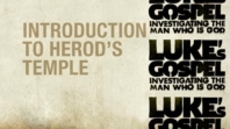
Introduction To Herod's Temple
September 27, 2009
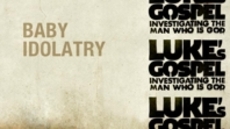
Baby Idolatry
September 27, 2009
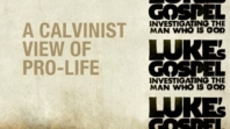
A Calvinist View Of Pro-Life
September 27, 2009
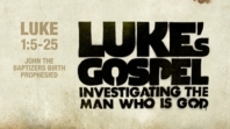
Elizabeth's Shame
September 27, 2009

Don't Get Drunk On Your Freedom
September 27, 2009
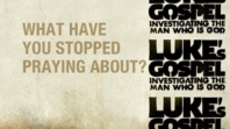
What Have You Stopped Praying About?
September 27, 2009
